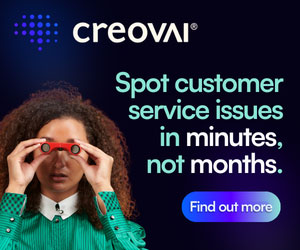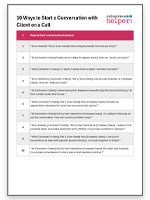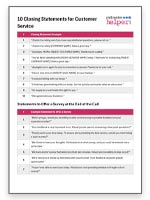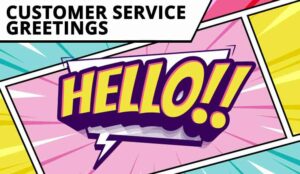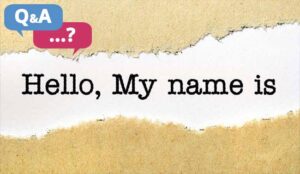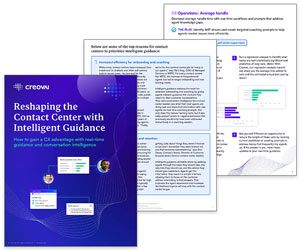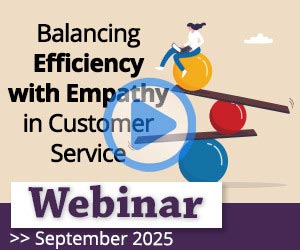How an agent starts and ends a customer conversation has the potential to impact everything from customer satisfaction to the likelihood of a repeat call – it goes beyond simply saying “hello” and “goodbye.”
These moments play a crucial role in shaping the overall experience, influencing everything from customer satisfaction to the chances of a repeat call.
How an agent approaches these interactions can set the tone for the conversation and leave a lasting impression.
In this article we take a look at the best ways to start and end a customer conversation, providing tips and examples of spiel that can help.
How to Start a Conversation with Client on Call
For starting a conversation, it’s important to create a positive first impression with a friendly and professional tone.
So we have put together some examples and tips to help set the right tone.
Examples of How to Start a Call
The following ten examples outline some great call opening spiel, which you can start using in your contact centre scripts:
- “Good morning! This is [Your Name] from [Company Name]. How are you today?”
- “Hi [Customer’s Name], thank you for calling [Company Name]. How can I assist you today?”
- “Hello [Customer’s Name], it’s great to speak with you again. How have you been?”
- “Good afternoon, [Customer’s Name]. This is [Your Name], your account manager at [Company Name]. How can I help you today?”
- “Hi [Customer’s Name], I understand you’re having an issue with [specific product/service]. I’m here to help resolve that for you.”
- “Hello [Customer’s Name], this is [Your Name] from [Company Name]. We have an appointment scheduled for today. Are you ready to get started?”
- “Hi [Customer’s Name], this is [Your Name] from [Company Name]. I’m calling to follow up on our last conversation. How can I assist you further today?”
- “Good evening, [Customer’s Name]. This is [Your Name] from [Company Name]. I wanted to let you know about an exciting promotion we’re offering. Do you have a moment to discuss?”
- “Hello [Customer’s Name], this is [Your Name] from [Company Name]. I see you’ve encountered an issue with [specific product/service]. Let’s work together to fix that.”
- “Hi [Customer’s Name], this is [Your Name] from [Company Name]. We value your feedback. Do you have a few minutes to share your recent experience with us?”
Printable – 10 Ways to Start a Conversation with Client on a Call
Do you want a copy of this to share with your team?
Get your free download of 10 Ways to Start a Conversation with Client on a Call now:
The Formalities
Beyond saying hello, there are some key elements that should be included in the beginning of every customer service conversation to get things off to the best possible start – as efficiently as possible.
Always Be Prepared
Being prepared is key, as Alex McConville, author of ‘Diary of a Call Centre Manager’ explains:
“It sounds so obvious, but I definitely hear more calls than I would like where the agent just isn’t prepared for the call, and this is a terrible start to any professional conversation!”
Make It Clear Who You Are and Where You Work

“Hello, how can I help you?” is a fairly standard opening line in a contact centre, but are all of your agents introducing the business too? To remove any chance of confusion, agents should always introduce themselves AND the business as soon as possible.
As Alex agrees, “Stating your name during any introduction is vital and a MUST for me, it really needs to be a priority.”
For example, “Call Centre Helper, you’re speaking to Robyn. How can I help you?” offers far more clarity earlier on than a simple “Hello, how can I help?”
This is particularly pertinent for outbound calls, as asking straightaway to speak to Mr Jones can also be a bit of a faux pas.
Whoever has picked up the phone needs to know who they are speaking to first. The agent could also risk putting the customer on the defensive not knowing who they are speaking to – and getting the call off to a very bad start.
Double-Check Who You Are Speaking To (for Data Protection)
Immediately after introducing themselves, agents should then double-check they are talking to the correct person too.
This can help to “tick the box” for data protection purposes, as well as making sure the forthcoming conversation is relevant to the person on the other end of the line.
Ask if Now Really Is a Convenient Time to Talk
This one is fairly standard for outbound calls, and can seem somewhat unnecessary for inbound calls. However, it’s another question worth asking – particularly if queries typically take longer than 2 or 3 minutes to resolve.
For example, if the customer has come through to a line to set up a new phone contract, a simple “this is going to take 5–10 minutes to complete, do you have time, or would another time be more convenient?” can help to manage expectations from the outset and get the call off to the best possible start.
Our article How to Set the Right Expectations on a Call contains helpful tips on how call centre agents can set and manage customer expectations on a call
Ask if the Customer Minds You Addressing Them by Their First Name
Whilst an agent might start out confirming that they are talking to Mr John Smith, it can go a long way to immediately ask them what name they’d like the agent to refer to them by.
This can help to relax the conversation and continue on a more positive, friendly and informal note – and build rapport.
Ask an Open Question
You then need to take control of the conversation by asking an open question.
This is particularly important for outbound calls, as Alex says, “You MUST, MUST, MUST end your introductory spiel with an open question. You called them, YOU need to lead the call at the early stages.”
Adapting to the Customer
Every customer is different! That’s why – once the formalities are over – there are some split-second judgements the agent needs to make.
Often, getting this right can be the difference between kick-starting a great conversation – and falling at the first hurdle.
Here are some key questions every agent should ask themselves in the opening minutes of a call…
Does This Customer Want to Chit-Chat or Not?
There’s not a one-size-fits-all approach agents can fall back on here. It takes time and experience to recognize whether a customer wants to chit-chat or whether they want to get straight to the point, but here are some hints that can help agents spot which approach to lean into:
- Is someone giving blunt yes/no responses? Get straight to the point.
- Has someone already mentioned their daughter, dog or grandson? Maybe they want to chit-chat.
- Does someone sound a bit grumpy like you’ve caught them at a bad time? Get straight to the point.
Whatever the situation, it’s best to mirror the customer’s behaviour to get the call off to a good start.
Some customers love to talk, and for tips to help control a conversation with them, read our article: Call Control Techniques: Controlling a Runaway Talker on the Telephone
Does This Customer Sound as Though They Could Be Vulnerable or Elderly?
When agents realize they are on a call with a potentially vulnerable or elderly customer, they should make a conscious decision early on in the conversation to slow things down a bit.
They should also invest that bit more time in double-checking that the customer understands who they are and what will happen next – before proceeding to the main purpose of the call.
To find out more about how you can provide the best possible service to vulnerable customers in the contact centre, read our article: Dealing With Vulnerable Customers
Is Rapport Building Appropriate to the Nature of the Call?
Building rapport definitely has its place and is a good go-to for getting many conversations off to a good start, but it’s not always appropriate. Train agents to think twice before launching into chatty conversations with a customer.
For example, if the customer is in distress or seeking urgent help, there’s no time for chit-chat. This approach could be part of your core training if you are managing 999 emergency call handling teams, or customer care lines where agents may regularly handle calls about burst pipes or lost baggage. Sometimes there just isn’t time for the niceties of “how’s your day going?”
Note: Rapport building isn’t entirely redundant in these situations, but it’s more about applying knowledge, being patient and having empathy – rather than asking if they saw the football last night.
Should I REALLY Ask This Customer if They Saw “Love Island” Last Night?
Can you imagine a young agent asking an elderly gentleman if he’d watched “Love Island”? Or how well the conversation would go if an agent asked someone if they’d watched the football, only to fall short when the customer said “yes” and suddenly asked what they thought about “Anderson missing that goal”.
Kick-starting rapport building as early on in the call as possible can help to get the conversation off to a great start, BUT agents should stay away from specific questions to avoid the risk of creating an instant barrier.
Instead, questions such as “did you have a nice weekend?” help to open the conversation up and prompt the customer to steer the conversation towards what really interests them.
Note: Agents have to be comfortable with what they are saying to avoid coming across as robotic. Agents should also have the freedom to choose how they get the call off to the best start, dependent on their own interests and experience. Give them guidance and flexibility, instead of exact wording and questions to follow.
How to End a Conversation with Client on Call
Ending a call effectively is just as important as starting one. A thoughtful and polite conclusion can leave customers feeling valued. Here are some examples and advice to ensure a positive wrap-up.
Once the conversation is in full swing, there’s no telling exactly how long it will take to resolve the customer’s query.
What matters most is that the agent ends the call on a strong note – dotting the i’s and crossing the t’s to make sure the customer doesn’t need to call back again.
Examples of How to End a Call
The following ten examples outline some great call closing spiel, which you can start using in your contact centre scripts – also seen in our article on The Top 10 Call-Closing Statement Examples:
- “Thanks for calling and if you have any additional questions, please call us.”
- “Thanks for calling [COMPANY NAME]. Have a good day.”
- “Goodbye, Mr/Mrs [INSERT CUSTOMER NAME], thank you for calling.”
- “You’ve been speaking with [INSERT ADVISOR NAME] today. Thank you for contacting [INSERT COMPANY NAME]! Have a great day.”
- “Apologies once again for any inconvenience caused. Thank you for your call.”
- “Have a nice time in [INSERT PLACE NAME] on your holiday.”
- “I enjoyed talking with you today.”
- “It has been great talking with you today. Let me quickly summarise what we discussed.”
- “I’m happy we could make this right for you.”
- “We appreciate your business.”
Printable – 10 Closing Statements for Customer Service
Do you want to download this to share with your team?
Get your free download of 10 Closing Statements for Customer Service now:
The Formalities
Clarify Exactly What’s Going to Happen Next
If there are follow-up actions to a call – such as an engineer will be visiting next Tuesday – it can help to wrap up the call by explaining exactly what will happen next.
For example, the agent reassuring the customer that they’ll receive a text message appointment confirmation by the end of the day, that the engineer will be on site for 2 hours, and so on.
It may take a bit of extra time, but is the agent runs through the next steps in advance, customers will feel more confident of what’s to come – without needing to make chasing calls.
This comes down to the agent taking ownership of the customer’s query or problem at all times, as Alex adds,
“Agents should really avoid just blindly transferring to another department or saying they will send an email to a mailbox – when they know deep down that won’t go anywhere.”
Wrap Up the Call by Recapping the Key Points Discussed
It’s best practice to then wrap up a call by recapping key points to summarize what’s been discussed and ask if they have any queries – particularly around what’s going to happen next.
This is especially important if agents have had a particularly complex matter or very chatty customer to deal with, as it can help to ensure the conversation is wrapped up in its entirety (even if the conversation did go off on a tangent).
Send Them an Email to Summarize the Call
If the matter is complex, it can also help for an agent to reassure the customer that they’ll send an email to summarize – and remember to actually send it!
This can help to avoid an unnecessary callbacks, and can also offer support to more vulnerable customers who may need to share the information with a family member.
If you are looking for advice to improve the quality of your customer service emails, read our article: The Secrets to Writing Better Customer Emails
Ask “Is There Anything Else I Can Help You With?”
Whilst this one always leaves the gate open for the predictable, eye-rolling response of “tonight’s lottery numbers”, it’s always best for agents to ask “Is there anything else I can help you with today?” before they close the call – just in case something has been missed.
Confirm Contact Details and Remind Them of Their Agent’s Name
Another good tip is for agents to remind customers of their name and contact details and offer them the opportunity to call them back directly (if systems allow) if they do happen to think of any further questions after the call has ended.
Let the Customer Know to Expect a Customer Satisfaction Survey Text or Email
If your contact centre is also running a customer satisfaction survey, it can help to boost completion rates by prompting customers to look out for the text or email and take part.
Call THEM Back if Something Has Been Missed
It doesn’t stop there, when the call has ended and the agent is in wrap time – encourage them to review the call, complete any actions needed, and if there is anything that has been missed or needs further clarification, call the customer back!
Nobody’s perfect and this extra bit of due diligence will save the customer from having to call back themselves later on.
With thanks to representatives from Endsleigh Insurance Services, Admiral, Gloucestershire Police Service and Virgin Atlantic – who wish to remain anonymous.
If you want to read more about ways to open and close a call, look at these articles next:
- 10 Top-Notch Customer Service Greeting Examples
- How to Build Rapport on the Phone – With Examples
- Customer Service Greetings – The Good, the Mediocre and the Innovative
Author: Megan Jones
Reviewed by: Robyn Coppell
Published On: 19th Jan 2022 - Last modified: 6th Jan 2026
Read more about - Skills, Alex McConville, Call Handling, Communication Skills, Customer Service, Editor's Picks, Free Downloads, Rapport, Skill Development, Soft Skills




